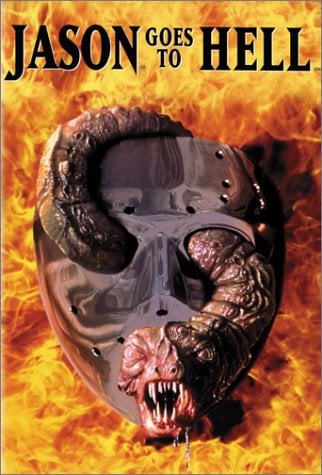After taking Manhattan in Friday The 13th Part VIII, hockey-masked horror legend Jason Voorhees returns for the supposedly last time to take a different kind of vacation in Jason Goes to Hell: The Final Friday. Following the blood path from Freddy’s Dead: The Final Nightmare, the film tries to prove that this is the true end of the series twice in the title. Jason already wrote his first Final Chapter in 1984, yet the title still leaves the opening for another sequel. Jason Goes to Hell, but it doesn’t say anything about him staying there.
Still, preparing this as the blood-drenched finale, series engineer Sean S. Cunningham (who produced and directed the original Friday The 13th) returns to show his famed creation the door to Hades. Opening like just about every other Friday film, the action takes an unexpected (but certainly welcome) turn within the first ten minutes. After the standard “lights go out while you’re in the shower” scenario, an unwelcome female visitor to Camp Crystal Lake bears witness to the reappearance of Jason Voorhees, a host to maggots who has a real problem with young people.
As he lummoxes toward his next victim in the dark and desolate forest, little appears different from the previous eight in this franchise. As the fans might say “if it ain’t broke, don’t fix it.” When Jason raises his trademark machete (which is so rusty it must do more damage with tetanus), a flood of bench lights fill the forest arena as a S.W.A.T.-style F.B.I. task force bombard the maniac with an assembly line of bullets, finally blowing him to smithereens and into the opening titles. Within ten minutes, the fans are rewarded with what they have anticipated for over a decade: the death of Jason Voorhees. If there were any regard for them whatsoever, he would have gone straight to the end credits from here.
Instead, he is resurrected again, even though he is without a mutilated carcass to carry out his bloodstained chores. Jason turns out to be powered by a demon that dwells in his (literally) black heart and his body was merely a vessel for destruction. The coroner examining it is hypnotized into eating the heart and thus absorbing the ogre’s soul. With the ability to change form at any given time, Jason must now track down his long-lost niece (Kari Keegan) in order to be properly reborn. “Jason needs a new body,” proclaims Creighton Duke (Steven Williams), a bounty hunter who somehow has all the info on the knife-wielder. If he has been wearing the same body for about fifteen years, what is the problem now?
Not that the original films were gold, but the premise of the first was an interesting one: a young boy (Jason) drowns at a summer camp many years ago and two counselors are murdered the following year. Upon reopening of the camp, a series of grisly murders begins. While even the absolute best of this series were cheesy and dumb, Jason Goes to Hell stands alone as a vile, mean-spirited bore. The sight of Jason claiming his victims is neither scary nor shocking. So much effort is put into making each death as sadistic and slow as possible for the victim you get the feeling Director Adam Marcus truly hated just about every character in this film. At one point, Jason changes bodies from a town police officer to a slimy TV anchor. The transition for the anchor is quick, while the police officer slowly melts away; watching the remainder of his face ooze off.
To say that the series loses it’s roots would be obvious. Since this is part nine of the franchise, one would expect that the story would take a different direction. But Jason Goes to Hell replaces the revenge plot of the original two films with supernatural mumbo-jumbo. Since Jason is just a “demon,” there was never any reason to pay attention to the story, because watching a demon kill for no purpose is pointless. Watching a tortured soul who longs to regain the childhood he lost is, however violent, interesting.
The film is as torturous an experience for the viewer as it is for the victims. It is of worth only for the last shot, which promises—how do I put it—the battle of the century. Jason may go to hell, and in a way, we do, too.











